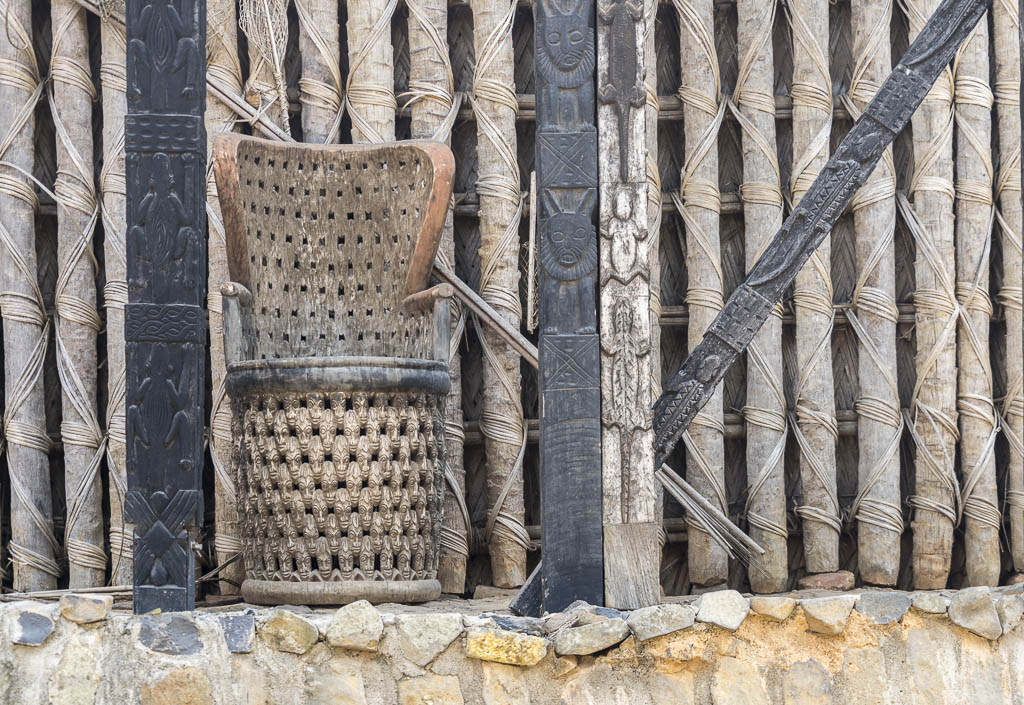Day 1011-1013 - The „Grassfields“
The four western regions of Cameroon are in many ways different to the rest of the country. Especially in the North-West Region, the so-called „grassfields“ ancient „Fondoms“ (kingdoms) bear a significant importance up to the present day. And there are literally hundreds of them in the area. Formally the fondoms fall under the jurisdiction of the cameroonian government, nevertheless the incumbent fons (kings) still enjoy great popularity and keep performing some of their traditional duties. The fondoms are complex societies that theoretically could still function independently nowadays.
In Bafut we visited the palace of one of the most influencial fons in the region. Through a tall gate we rolled onto the royal grounds. In the courtyard in front of the palace that is being used for gatherings, we stopped in the shade of the only tree in sight. We’d just gotten off the bikes when a lady dressed in pink approached us and addressed us with the words: „Welcome! I’m Queen Mary. You can’t park here, that’s our holy tree. If the king comes out and sees that he will not be pleased.“ Of course we couldn’t be disobedient and parked the bikes in the beating sun. After reinstalling law and order queen Mary proceeded to show us the palace.
In wetsren Cameroon English is spoken, or rather Pidgin-English, a sometimes quite diffcult to understand version of English, that incorporates a lot of words from local languages. Until 1961 the four western regions were part of the British colony West-Cameroon while the other parts of the country belonged to the french mandated territory of East-Cameroon, until independence in 1960. The colonial powers each installed administrative, educational and judical systems according to their own structures, that to this day remain characteristic in the respective regions. The combination of this colonial legacy, two official languages (in addition to about 280 local languages) and the heritage of countless traditional kingdoms, make it an extremely difficult task to unite the diverse population on an equal footing. It remains a great challenge for Cameroon. For decades the anglophone part of the population has been feeling disadvantaged and marginalized by the francophone government. The government has come in for a lot of criticism regarding many aspects of public life, but a key factor is the neglect of the English language. This circumstance is actually very noticable even for us outsiders. If we didn’t know we were in a biligual country there would be little chance to notice.
After our visit in Bafut we wanted to keep exploring the beautiful landscapes of the grassfields. Unfortunatelly it was a very hazy day with a lot of dust in the atmosphere and hence a pretty bad visibility. And once we left the asphalt behind us we were constantly covered in a thick cloud of red dust. I really liked the mountainous landscape and the lush vegetation but under these circumstances I didn’t even feel like stopping to take some pictures. Out of an impulse we decided to turn around and instead push on a little further towards the nigerian border. That same evening we learnt that we had made a very good decision without even knowing.
The staff and a guest at our hotel informed us that the whole of western Cameroon has been on strike for a month now, fighting for independence or at least a greater degree of self government and eaqual rights. Schools, courts and administrative offices have suspended work at the beginning of the new year. Mondays to Wednesdays peaceful protests in form of „ghost towns“ and „no movement“ are held throughout the four regions. Which means that stores remain shut, people stay at home and any traffic is inhibited by makeshift road blocks. Lucky for us that we were now only 100km away from the border on this sunday evening. Early monday morning we wanted to try our luck and see if we can cover the remaining 100km without getting into trouble. We started the day on an empty stomach because the hotel staff who had promised us an early breakfast collectively didn’t show up for work.
„No movement“ turned into completely „free movement“ for us because the streets were deserted and even the guys at the military checkpoints didn’t bother us and just let us pass without seeing our papers. Maybe it was still too early for them.
Joey
Tag 1011-1013 - Die „Grassfields“
Die vier westlichen Regionen Kameruns sind in vielerlei Hinsicht anders als das restliche Land. Besonders in der North-West Region in den sogenannten „Grassfields“ haben traditionelle „Fondoms“ (Königreiche) noch heute eine signifikante Bedeutung. Und von denen gibt es Hunderte in diesem Teil des Landes. Formal sind die Fondoms natürlich in die Regierungsstrukturen Kameruns eingegliedert, dennoch genießt der amtsinhabende Fon (König) nach wie vor ein hohes Ansehen in seinem Reich und übt weiterhin einige seiner traditionellen Aufgaben aus. Die Fondoms sind komplexe Gesellschaftssysteme und könnten theoretisch auch heute noch unabhängig fungieren.
In Bafut haben wir den Königspalast eines der bedeutensten Fons besucht. Durch ein großes Tor rollten wir auf den Vorplatz, der für Versammlungen genutzt wird, und hielten im Schatten des einzigen Baumes weit und breit. Kaum abgestiegen kam eine Frau ganz in Pink gekleidet auf uns zu und begrüßte und mit den Worten: „Willkommen! Ich bin Königin Mary. Ihr könnt hier nicht parken, das ist unser heiliger Baum. Wenn der Fon raus kommt und das sieht, wird ihm das überhaupt nicht gefallen.“ Da konnten wir uns natürlich nicht widersetzten und parkten die Motorräder in der knallen Sonne. Dann führte uns Queen Mary durch die heiligen Hallen des Palastes.
In West-Kamerun wird Englisch gesprochen, oder bessergesagt Pidgin-English, einer manchmal etwas schwierig zu verstehenden Abwandlung, die viele aus lokalen Sprachen adaptierte Wörter nutzt. Bis 1961 gehörten die vier westlichen Regionen zur britischen Kolonie West-Kamerun, der Rest des Landes jedoch bis zur Unabhängigkeit 1960 zum französischen Mandatsgebiet Ost-Kamerun. Die jeweiligen Kolonialmächte etablierten Verwaltungs-, Bildung- und Justitzwesen nach heimischen Vorbild, die auch heute noch die Strukturen in den jeweiligen Regionen prägen. Dieses koloniale Erbe, zwei offizielle Amtssprachen (neben ca. 280 lokalen Sprachen) und unzählige traditionelle Königreiche gleichberechtigt in einem einzigen Staat zu vereinen ist keine leichte Aufgabe und nach wie vor eine große Herausforderung für das Land.
Die anglophone Bevölkerung Kameruns fühlt sich seit vielen Jahrzehnten von der frankophonen Staatsregierung benachteiligt und marginalisiert. Die Kritik bezieht sich auf viele Bereiche des öffentlichen Lebens, aber die Sprache ist wohl der Bedeutenste. Die Vernachlässigung des Englischen ist auch für uns Außenstehende wahrnehmbar. Wenn man nicht wüßte, dass man sich in einem bilingualen Land befindet würde man das wirklich nicht mitbekommen.
Eigentlich wollten wir nach unserem Besuch in Bafut noch ein bisschen die wunderbare Landschaft der Grassfield erkunden. Leider war es sehr diesig und staubig sodaß die Sicht nicht besonders gut war und nachdem der Asphalt endete waren wir permanent in eine rotbraune Staubwolke gehüllt. Die bergige Landschaft und die dichte Vegetation haben mir super gefallen, aber bei der schlechten Sicht hatte ich nicht mal Lust anzuhalten und Fotos zu machen. Aus einem Impuls heraus beschlossen wir umzudrehen und lieber noch ein Stück weiter Richtung nigerianische Grenze zu fahren. Eine sehr gute Entscheidung wie sich noch am selben Abend herausstellte.
Im Hotel erfuhren wir, daß es seit etwa einem Monat in den vier westlichen Regionen für die Unabhängigkeit oder zumindest eine stärkere Selbstverwaltung gestreikt wird. Schulen, Gerichte und Verwaltungseinrichtungen haben schon seit Anfang des Jahres den Betrieb eingestellt. Und von Montag bis Mittwoch findet ein friedlicher Protest in Form von „Ghost Towns“ (Geisterstädte) oder „No Movement“ (keine Bewegung) statt. Das bedeutet, daß alle Läden geschlossen bleiben, die Leute zu Hause bleiben und jeglicher Verkehr auf den Straßen, teilweise durch Barrikaden, unterbunden wird. Unser Glück also, daß wir an diesem Sonnatgabend schon 100km vor der Grenze waren. Ganz früh am Montagmorgen wollten wir unser Glück versuchen und sehen, ob wir es auch die restlichen 100km noch schaffen. Allerdings mußten wir mit leeren Bäuchen los, denn das Hotelpersonal das uns Frühstück versprochen hatte war gesammelt nicht zum Dienst erschienen.
„No Movement“ wurde für uns zu „Free Movement“, denn die Straßen waren wie leer gefegt. Auch die üblichen Polizei- und Militärcheckpoints ließen uns passieren ohne auch nur einmal unsere Papiere sehen zu wollen. Vielleicht war es einfach noch zu früh für sie.
Joey
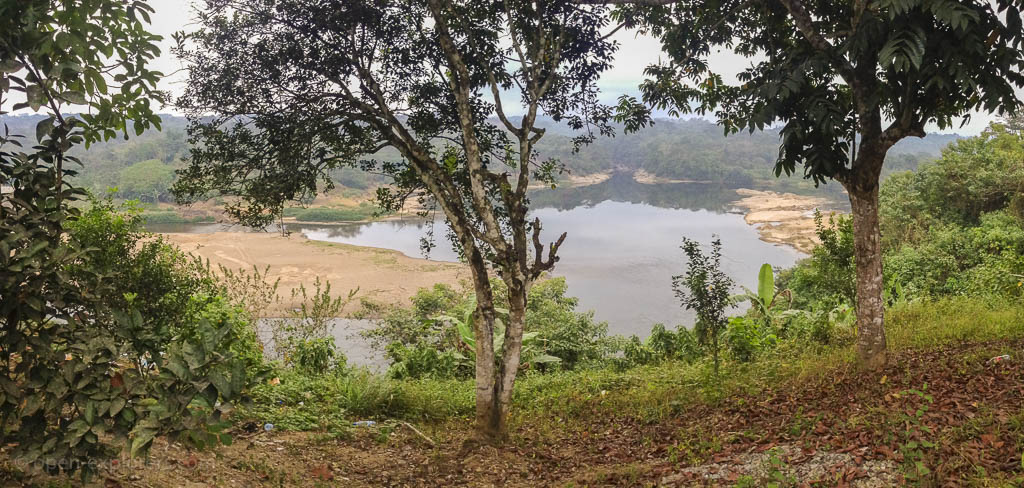
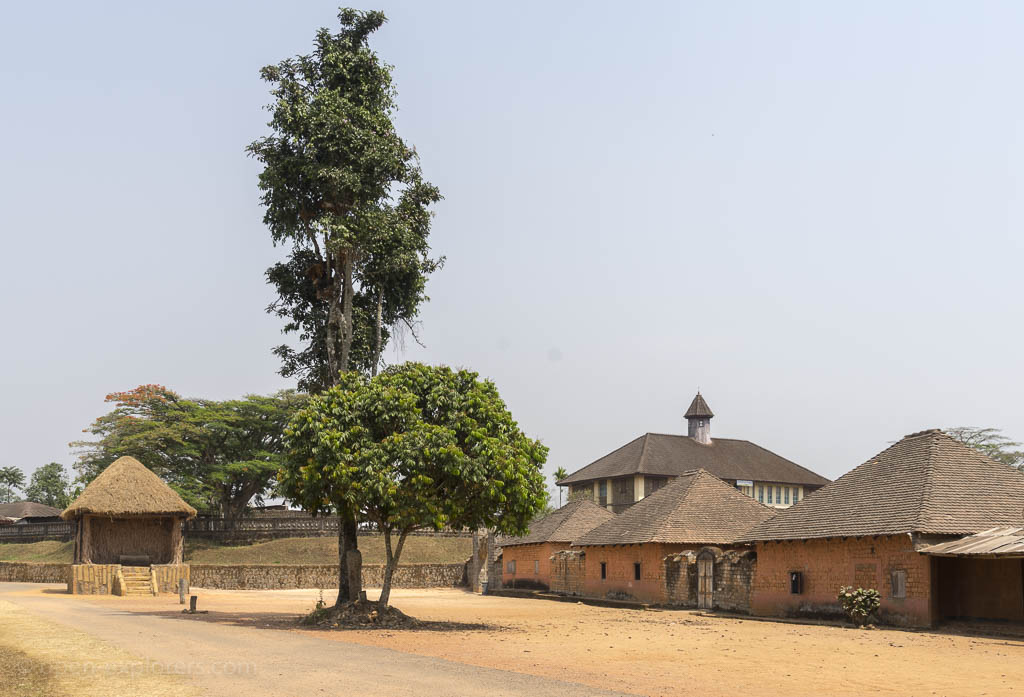
The assemply space and holy tree in front of the palace. The mall hut on the left houses a huge gong carved from a tree trunk. When the gong sounds all the villagers gather to hear the news the king has to pass on to them.
Der Sammelplatz und heilige Baum vor dem Palast. In dem kleinen Hütte links im Bild befindet sich ein aus einem Baumstamm geschnitzter Gong. Wenn der ertönt finden sich die Dorfbewohner hier ein um die Neuigkeiten zu erfahren die ihnen der König mitzuteilen hat.
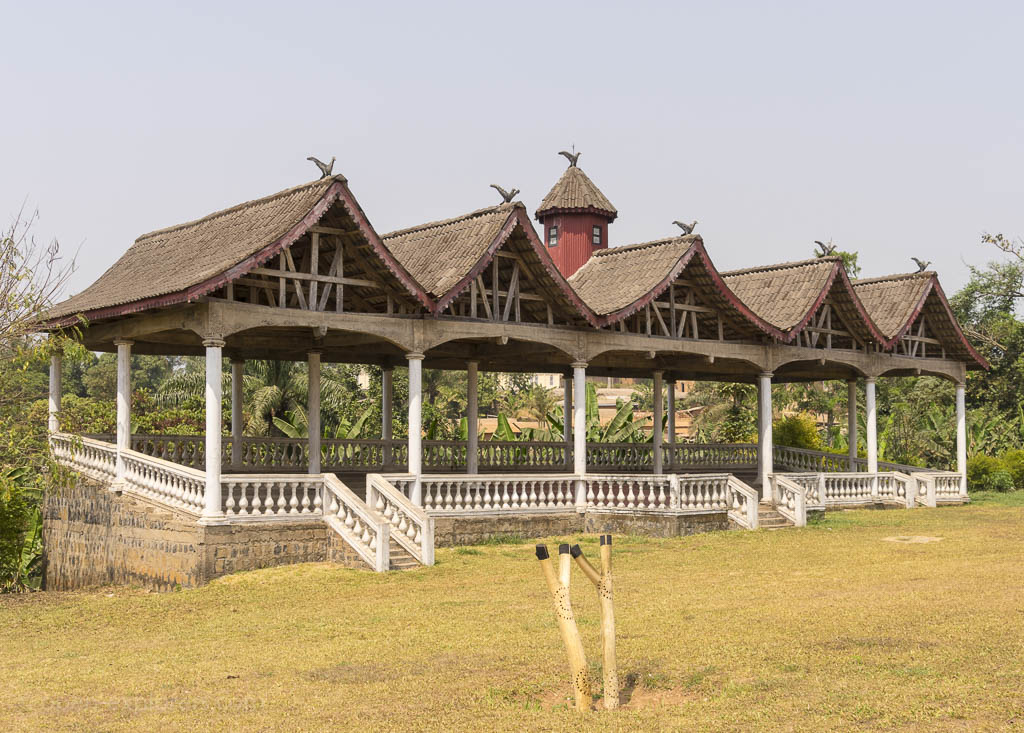
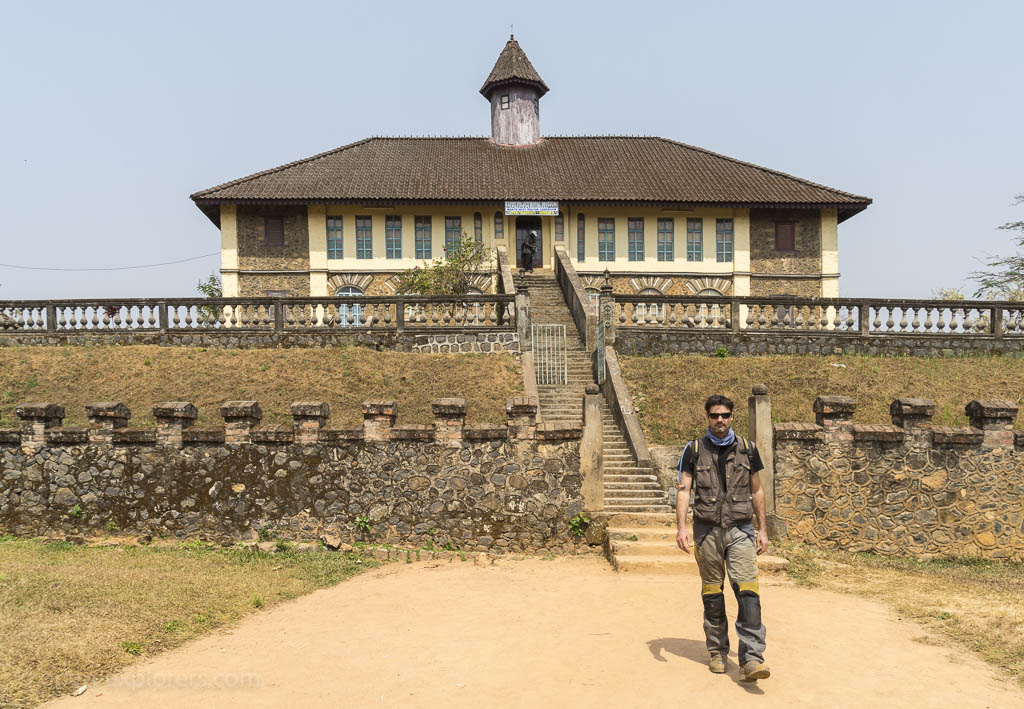
The former living quarters of the king now house a very nice museum. The place is stacked with king-wardrobe, statues and lots of wooden masks that are used for traditional dances and festivities. Unfortunatelly we were not allowed to take photos inside the museum.
Most of the buildings of the palace were rebuilt with german help in the 1900s after the first german colonialists in the area defeated the Bafut kingdom (in the 1890s during the Bafut wars) and burnt the whole place down.
Die ehemaligen Wohnräume des Königs sind heute ein sehr schönes Museum wo man die Königsgewänder, Statuen und Holzmasken für traditionelle Tänze und Feiern anschauen kann. Leider durften wir im Museum keine Fotos machen.
Die meisten der Palastgebäuse wurden um 1900 mit deutscher Hilfe wiederaufgebaut, nachdem die ersten deutschen Kolonialisten in der Region das Bafut Königreich (in den 1890er Jahren während der Bafut-Kriege) besiegt hatten und fast die gesamte Anlage abgebrannt hatten.
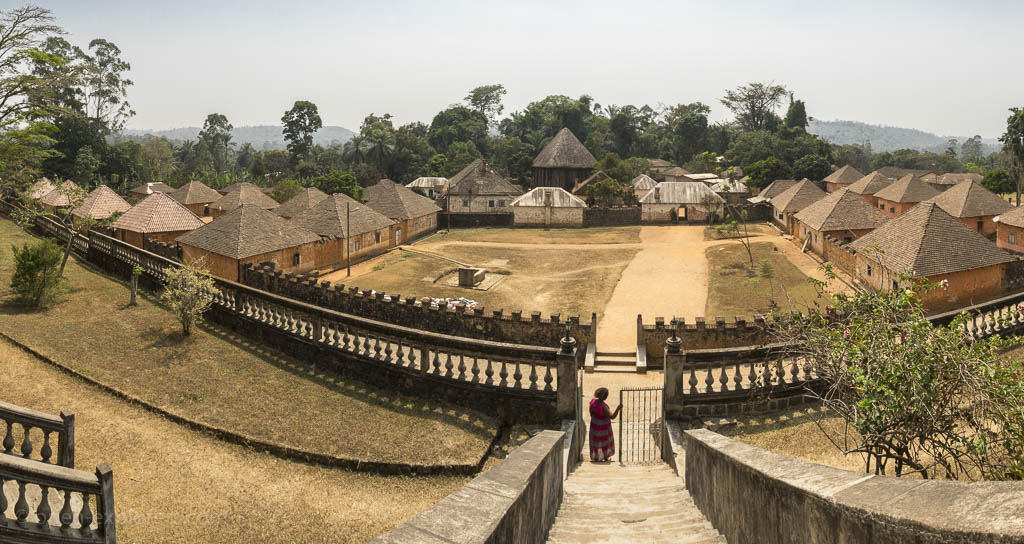
Queen Mary is one of 48 wifes of the current king. He's been in power for 50 years and took over from his late father when he was 15. By now he's got over 200 children of his own and one day will be succeeded by one of his sons. It's a custom that the son inherits all the wifes of his father.
Queen Mary ist eine von 48 Frauen des aktuellen Königs. Er hat mit 15 Jahren das Amt von seinem verstorbenen Vater geerbt und hält seit 50 Jahren die Macht in seinen Händen. Er hat mittlerweile über 200 Kinder und einer von seinen Söhnen wird irgendwann den Thron erben. Es ist Tradition, daß der ebenfalls die Frauen seines Vaters erbt.
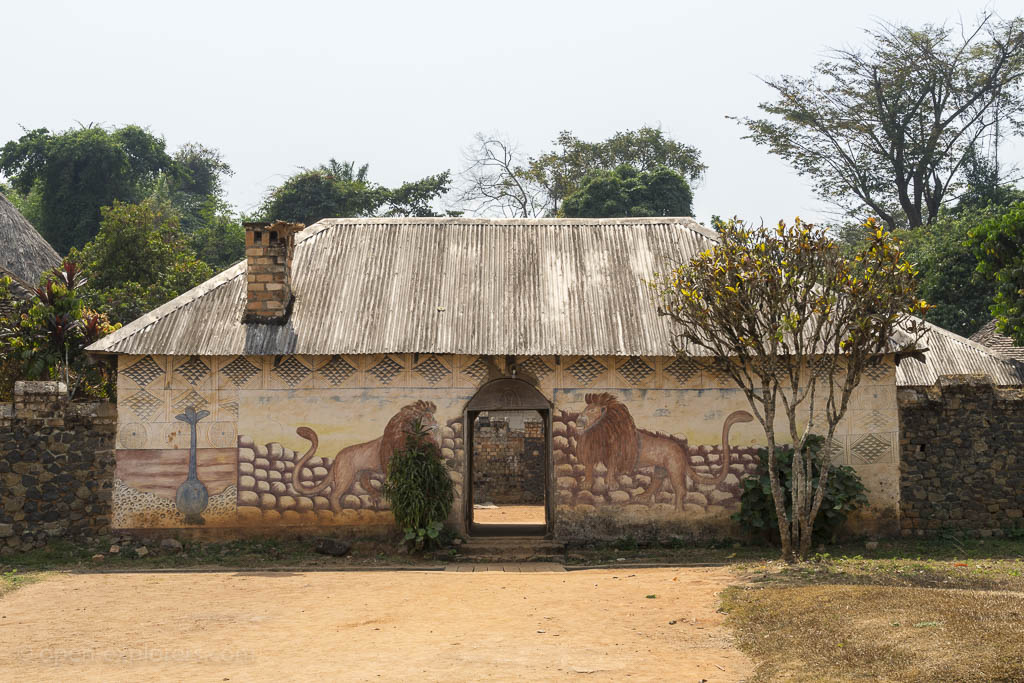
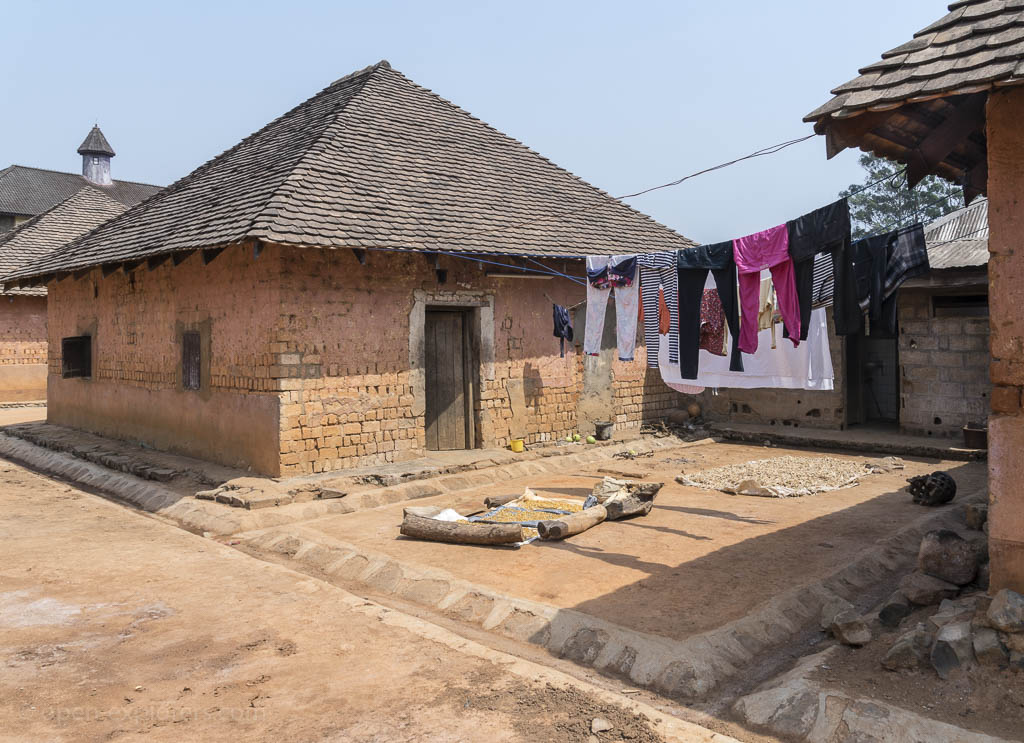
The living quarters of the wifes and children
Die Wohnhäuser der Frauen und Kinder
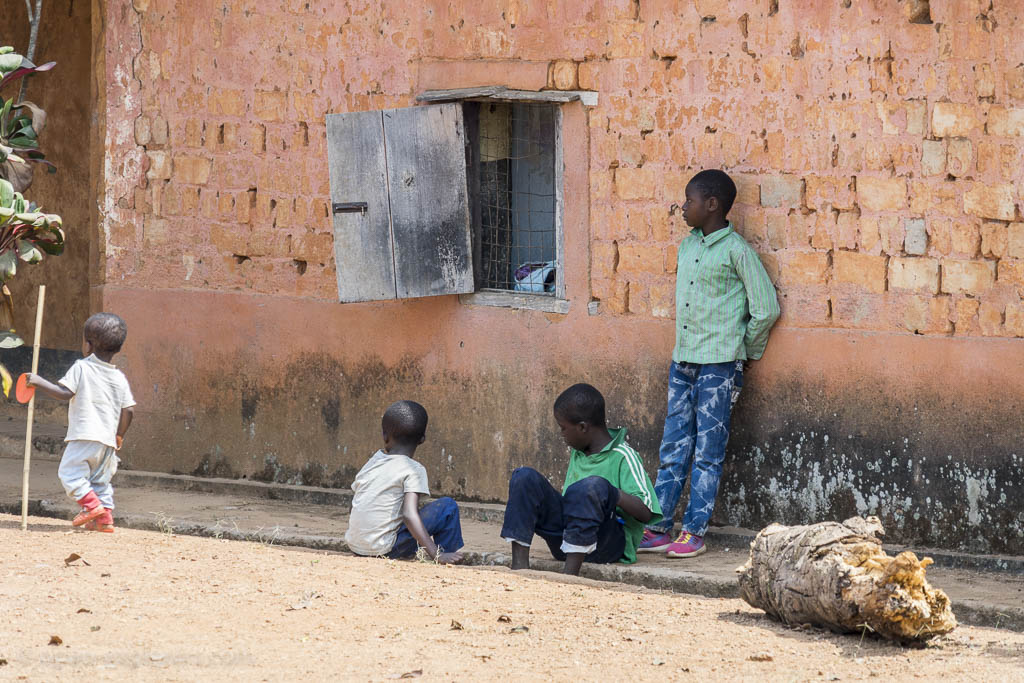
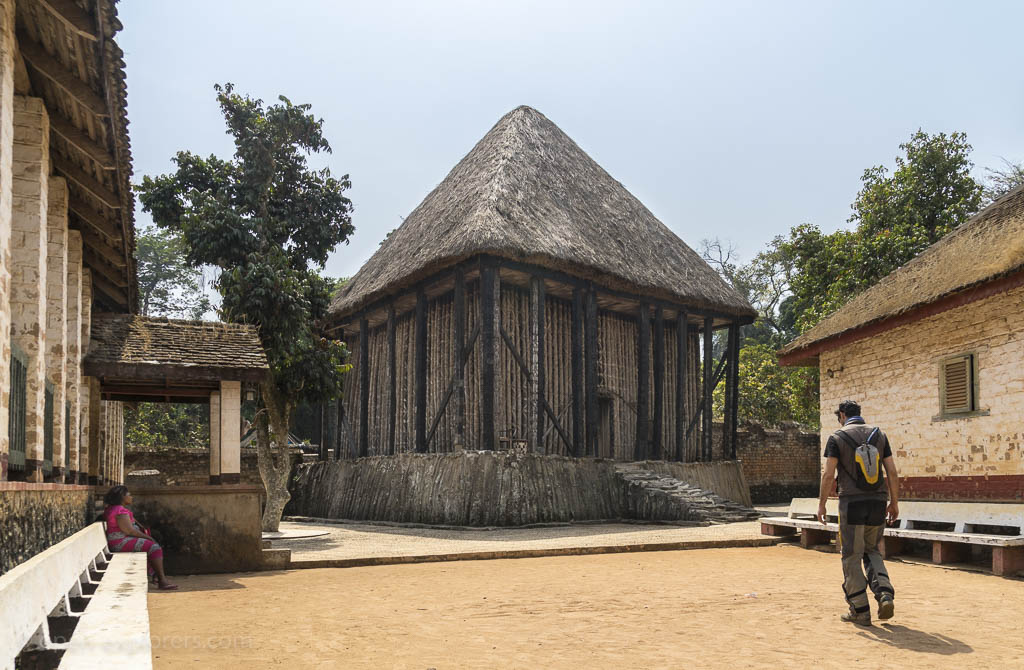
The centerpiece of the palace is the so-called Achum. It is the only building that has survived the german riots and houses the spirits of the former Bafut kings. Only the king himself and some high-ranking people in the palace are allowed to enter the building. Every year a "grass-cutting festival" is held and the roof of the Achum is renewed by putting fresh reeds ontop of the old ones. Every other decade or so the ever-growing roof is replaced by a completely new one.
Das Herzstück des Palastes und das einzige Gebäude das die deutschen Angriffe überlebt hat ist des sogenannte Achum. Hier leben die Geister der vormaligen Könige und nur der König selbst und ein paar hochrangige Palastbewohner dürfen das Achum betreten. Während des jährlich stattfindenden "grass-cutting festivals" wird das Dach, durch das Auftragen frischen Reets, erneuert. Alle paar Dekaden wird das ständig in die Breite wachsende Dach dann komplett abgetragen und erneuert.
